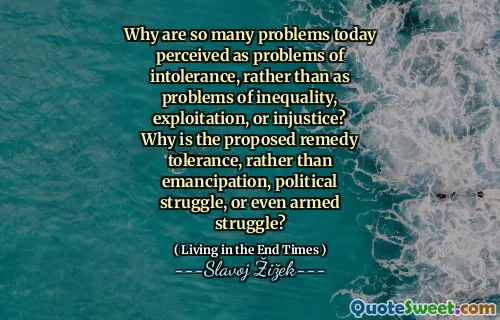"Living in the End Times" is a thought-provoking book by Slavoj Žižek that explores contemporary socio-political issues through the lens of various ideologies and global crises. Žižek argues that we are currently facing multiple existential threats that challenge the very fabric of society, including ecological catastrophes, economic instability, and rising nationalism. He examines how these crises intertwine and culminate in a sense of dread about the future, leading to a feeling of living in apocalyptic times.
The author delves into the ideologies that shape our understanding of these crises, critiquing both capitalism and communism while suggesting that existing structures may not be adequate to address the complex problems at hand. Žižek emphasizes the importance of radical thought and action to transcend the limitations imposed by traditional political paradigms. He encourages readers to embrace uncertainty and rethink their engagement with the world to navigate these turbulent times effectively.
Throughout the book, Žižek employs a mix of philosophy, psychoanalysis, and cultural commentary to shed light on the human experience amidst chaos. He reflects on how people react to crises, often clinging to old beliefs or looking for new saviors, and challenges readers to confront their fears and desires. By doing so, Žižek aims to inspire a sense of hope and possibility for reimagining our future, even in the face of what seems like the end times.
More »
Today Birthdays
1931 -
Mike Nichols
1926 -
Zig Ziglar
1955 -
William H. McRaven
1940 -
Dieter F. Uchtdorf
1921 -
James Jones
1988 -
Emma Stone
1671 -
Colley Cibber
1946 -
Sally Field
1930 -
Mark McCormack
1983 -
Adam DeVine
1972 -
Rebecca Romijn
1984 -
Patina Miller
1963 -
Laurene Powell Jobs
1968 -
Jerry Yang
1974 -
Zoe McLellan
1932 -
Francois Englert
1926 -
Frank Carson
1964 -
Arne Duncan
1916 -
Ray Conniff
1978 -
Taryn Manning
